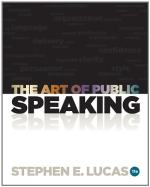|
This section contains 574 words (approx. 2 pages at 400 words per page) |

|
Summary
Chapter 2: Ethics and Public Speaking gives guidelines for ethical speaking gives guidelines for making sure that the message of the speech is ethical. By ethical standards, a speaker should be well-versed on the topic and prepared for the speech. Since an audience trusts that a speaker is presenting facts and not half-truths, all claims within the speech must be substantiated. Juggled figures and mere speculation can quickly result in a speaker's lack of credibility.
Epithets applied to various groups or minorities have no place in an ethical speech. Derisive remarks about religions and life-style choices are also taboo. Public references that are sexist, racist, and otherwise abusive reinforce attitudes that encourage prejudice. Of course, name calling is strictly forbidden in an ethical speech. On this note, free speech is protected by the First Amendment. However, depending on the scope of...
(read more from the Chapter 2: Ethics and Public Speaking Summary)
|
This section contains 574 words (approx. 2 pages at 400 words per page) |

|




